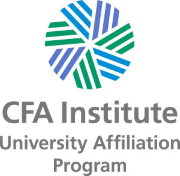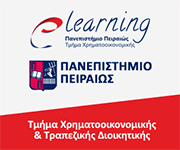Financial Management
Course Name: Financial Management
Teachers: Dimitrios Kyriazis
School: Finance and Statistics
Department: Banking and Financial Management
Level: Undergraduate
Course ID: ΧΡΧΡΗ01-1 Semester: 3rd
Course Type: Core Course
Prerequisites: –
Teaching and Exams Language: Greek
Course Availability to Erasmus Students: Yes
Course webpage: –
Specific Teaching Activities |
Weekly Teaching Hours |
Credit Units |
Lectures |
4 |
6 |
Course Content
- The Business Corporation and its Environment. The role of the financial manager.
- The Time Value of Money- The concepts of Discounting and Present Value.
- Investment Valuation under conditions of Certainty of Cash Flows.
- Shares and Bonds.
- An Introduction to the Working Capital Management.
- Break-Even Point Analysis and Operational Leverage Analysis.
Teaching Results
The main objective of the course is to form an introduction into the basic concepts of Financial Management focusing on the investment decisions. The students after the successful completion of the course should have developed basic knowledge of :
- The principles of discounting cash flows and the basic methods of investments’ evaluation under the conditions of certainty of cash flows (e.g. criteria of Net Present Value/NPV, Internal Rate of Return/IRR, e.tc.) applied by financial managers of contemporary corporations of the private sector.
- The characteristics of shares and bonds issued by a public limited company.
- The main concepts of working capital management and operational leverage.
Also, it is expected that students will attain basic skills with respect to problem solving related with the :
- applications of the rule of the Net Present Value & Discounting both at the individuals’ level of investment decisions (e.g. estimation of loan instalments, instalments of retiring and pension schemes) as well as at the level of corporations (e.g. evaluation of investment projects based on the NPV and the IRR rules)
- main valuation methods of shares and bonds and computation of the investors’ returns.
Furthermore, it is expected that the students, in order to respond to the cognitive requirements of the course, should develop at an elementary level the abilities of:
- a combination of a practical way of thinking and analyzing investment decisions with finance theory
- efficient time management and
- professionalism regarding their obligations (e.g. keeping deadlines, efficient completion of a project and presentation, e.tc.)
Skills
- Autonomous work
- Analysing and solving problems
- Decision making
Teaching and Learning Methods - Evaluation
Lecture: Face to face (traditional) teaching
Use of Information and Communication Technologies: Use of the electronic platform (e-class) of the University of Piraeus for uploading supporting material (PowerPoint slides of the instructor, excel files, e.tc.) related with the course and for having contact with the students (e.g. announcements of the instructor, e.tc.)
Teaching Analysis:
Activity |
Semester Workload |
Lectures |
38 |
Tutorials (7) |
14 |
Preparation for delivering exercises of tutorials |
30 |
Autonomous study for exams |
105.5 |
Total |
187.5 |
Student Evaluation:
Language : Greek
Assessment method:
- 90% final written examination (40%, 20 multiple choice questions and 60%, 4-5 exercises –problem solving)
- 10% participation in the tutorials and delivery to the instructor of solved tutorial exercises.
Criteria available in the webpage:
Recommended Bibliography
– Recommended Bibliography:
Brealey, R., Myers, S., Allen, F. (2013). «Αρχές Χρηματοοικονομικής των Επιχειρήσεων», 10η Αμερικανική έκδοση- 1η Ελληνική έκδοση, Εκδ. Utopia, Αθήνα.
Β. Optional textbooks
Damodaran, A. (2014). «Εφαρμοσμένη Χρηματοοικονομική για Επιχειρήσεις», 3η Αμερικανική έκδοση- 1η Ελληνική έκδοση, Εκδ. Πασχαλίδη, Λευκωσία, Κύπρος.
Brealey, R., Myers, S. Marcus. A. (2009). “Fundamentals of Corporate Finance”. McGraw Hill International Edition, 6th edition.
Βασιλείου. Δ. και Ηρειώτης, Ν. (2008). «Χρηματοοικονομική Διοίκηση. Θεωρία & Πρακτική», Εκδ. Rosili, Αθήνα
– Related scientific journals:
The use of scientific journals’ articles is not required for this elementary and introductory level of teaching Financial Management.




